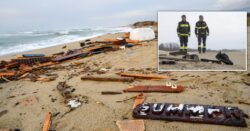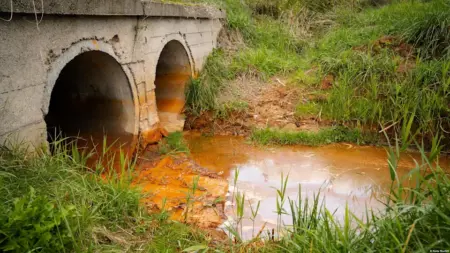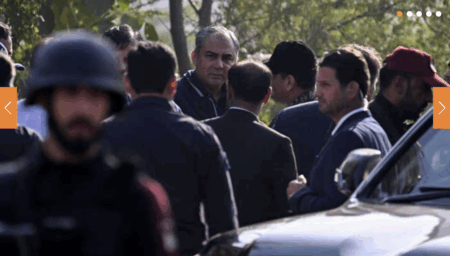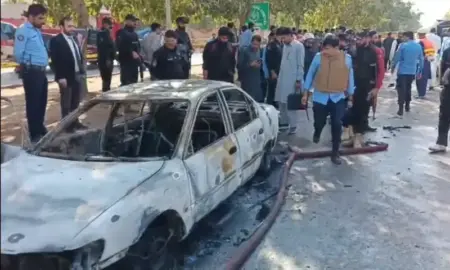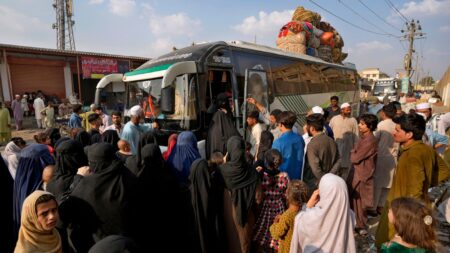Dozens of people died after the wooden boat shattered against the reefs (Picture: AP)
People smugglers threw young children into the sea to lighten an overcrowded boat that sank off the Italian coast, survivors claim.
At least 65 people have been confirmed dead after a boat carrying around 170 people sank only metres away from Italy’s Calabrian coast Sunday morning.
Fourteen of the victims were children. Around 80 people survived the shipwreck, according to Italy’s Coast Guard.
The wooden boat, which sailed from Turkey, broke apart against rocky reefs near the shore of Steccato di Cutro, a tiny village on the tip of Italy’s boot.
Survivors have shared harrowing stories of how the smugglers responded to the sinking ship (Picture: AP)
Newborns and babies are among the victims of the shipwreck (Picture: AP)
One survivor told the Italian newspaper La Stampa: ‘The traffickers started to throw kids out, they grabbed them by the arm and threw them in the sea.’
Another said the smugglers shoved at least 20 people overboard as the craft sank.
Sunday’s tragedy has touched off a wave of sorrow, grief and frustrated calls to action for politicians in Italy and beyond to do more to protect migrants.
Crotone mayor Vincenzo Voce arrived with flowers to a makeshift funeral home in a sports hall yesterday where countless coffins were laid out.
‘Smugglers are heinous criminals who throw people into the sea, without any scruples,’ Voce told La Stampa.
Desperate relatives and friends are in Cotone in the hope of finding their loved ones, many from Afghanistan, Iraq, Iran and Pakistan.
Prime Minister Giorgia Meloni shared her ‘deep sorrow’ over the incident (Picture: AP)
A search and rescue operation is hoping to find the dozens believed to be missing (Picture: AP)
‘They are still dead without a name,’ Voce added.
Three suspected smugglers – a Turkish national and two Pakistani nationals – have been identified, prosecutors say. A second suspect is believed to have escaped or died in the wreck.
The group charged each person €8,000, or about £7,000, to make the ‘voyage of death’, Italy’s border police said.
Italy’s far-right government has made immigration a top issue, with much of Prime Minister Giorgia Meloni’s election campaign fuelled by anti-migrant rhetoric.
She, among other things, has vowed to tighten the asylum process, increase repatriations and curb charity ships that rescue migrants crossing the Mediterranean.
Under Meloni, NGO-led search and rescue boats that have saved migrants on board cannot remain at sea – they must dock at ports manned by the authorities.
Her office would then say on Sunday: ‘…Meloni expresses her deep sorrow for the many human lives cut short by human traffickers.’
Italy is one of the main landing points for migrants seeking sanctuary in northern European nations (Picture: AP)
For some refugee rights groups, the wreck has revived memories of a migrant boat crash in 2013, when a tinny trawler caught fire and capsized near Sicily.
Hundreds of men, women and children died, while a search-and-rescue operation that lasted for years soon petered.
José Manuel Barroso, then president of the European Commission, said at the time: ‘We will do anything we can, with the means that we have, to change the situation.’
But activists say that Sunday’s disaster – that comes as nations such as Greece expel thousands of migrants and the UK looks to offshore some to Rwanda – shows that not much has changed in the years since.
Calabria has long been one of the most manageable places for asylum seekers to travel to from Turkey.
Around 15% of the 105,000 migrants arriving in Italy last year landed there, according to the International Organization for Migration, a UN agency.
A nearby sports centre has been turned into a makeshift funeral home as the death toll rises (Picture: AP)
But the central Mediterranean below is among the most deadly routes.
The International Organization for Migration has registered more than 17,000 deaths and disappearances in the central Mediterranean since 2014.
In 2022, 1,417 people died during the crossing. While this month alone, the group says, 158 deaths have been recorded.
The organisation tweeted: ‘This is not an emergency in numbers.
‘It is humanitarian.’

